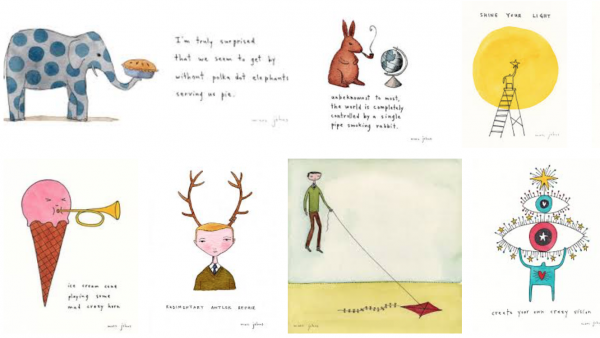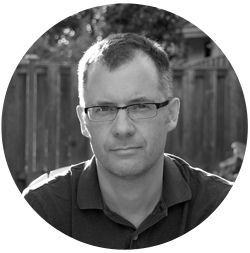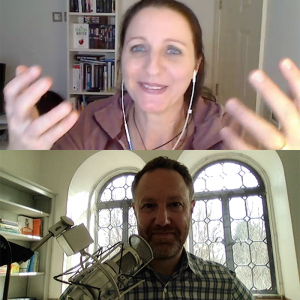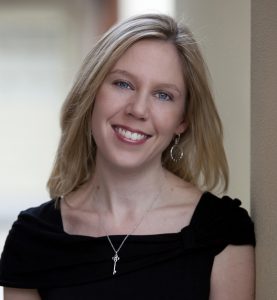This week I asked a group of writers and artists about their biggest distractions — the thing keeping them from working on their craft. I called these distractions “cave trolls” because they stand between the artist and their creative vision. Again and again, I heard about the distraction of the internet, and of how hard it can be to focus one’s attention when life is so busy.
So today, I want to talk about distraction. But I want to share an inspiring example of one person who is able to:
- Manage distraction.
- While also earning a full-time living as an artist.
That person is Marc Johns, who creates “whimsical drawings filled with dry wit and humor.” Here are some of Marc’s drawings:

Oh, and this is Marc:

Now, I want to repeat something: Marc earns a full-time living for him and his family (wife and kids) through these drawings. That’s amazing, right?! Maybe you are thinking that he is one those people where this is “easy.” Unfortunately for Marc, it isn’t easy. He and I had a long conversation where we dig into this.
You can listen to the podcast by clicking ‘play’ below, or in the following places:
In our conversation, he told me that:
- He tries to have a weekly work process, but it always gets derailed by family or other opportunities.
- He feels he is lousy at marketing.
- He goes through dry spells in terms of sales.
- He works from home and he says, “To be honest, it’s not ideal.” He doesn’t have the space or privacy that he needs.
- He doesn’t think much about marketing, just sharing.
- He can rarely tell what will work in terms of an illustation that will resonate with people. He shares different things, and he is sometimes shocked to see what people love. His conclusion: “I don’t know if you can have a strategy; you just have to be open to trying things. You don’t get to decide what works or doesn’t, they do.”
What Marc shares here is the reality of what it means to be a creative professional.
So, with all of this, how does Marc magically manage distractions? You are going to love this. It is a tool that all of us have access to. It is not only affordable, it is free. It’s called:
Not having a smartphone.
You can do this too! Walk to your trash can, put your smart phone in it, and walk away. Goodbye distraction!
Marc has never owned a smartphone. When I interviewed him, it was actually awhile back, and since then I see he joined Instagram, which REQUIRES a smartphone, or so I thought. I emailed him asking if he finally got one — he replied that he hadn’t. Instead, he bought an iPod Touch that allows him to use Instagram. He is diligent about turning off notifications.
So for Marc’s work, how does not having a smartphone benefit him?
Instead of being distracted by email or social media or texting, Marc says he is “distracted by art.” When he goes to a library or coffee shop, he doesn’t bring a smartphone and doesn’t bring a computer. He brings sketchbooks. Not only does he say that it focuses him on his drawings, but it also makes him more receptive to possible ideas throughout his day.
I understand what he means. Yesterday I was walking out of a restaurant, and the woman walking in walked in looking at her smartphone. The people on line were looking at their smartphones. The people eating were looking at their smartphone.
What Marc is doing is experiencing his day in a way that allows him to capture interesting new ideas. Being present in the world around him creates “space” in his mind to be receptive to ideas that will become art.
Now, is the smartphone the only thing that distracts people? Nope. But I find that it does come up a lot with the creative professionals I speak to. It also makes a larger point: distraction can be within your control, but it may require you to make polarizing decisions.
For instance: I don’t travel. Period. Travel stresses me out, distracts me, and quite frankly, I like being home with my family every single day. So I have a rule: no travel. But that has also effected my career in a profound way. I love public speaking, but can’t actively pursue that as a part of my career because I won’t travel to Portland or Austin or Charleston or many other wonderful places. Likewise, I can’t really take on many corporate clients because they would want a fair amount of in-person meetings with me. Again, travel and being away from family would be a core part of that. I choose not to do it, and over the last 7 years, that has cost me a ton of potential revenue and opportunity. But… that same decision has removed distraction and given me clarity to double-down on my creative work.
In my conversation with Marc, he shared his process for marketing his work and engaging in social media. If I had to whittle it down to one phrase, it would be this: be a human being. What Marc does:
- He posts regularly on social media: Instagram, Twitter, Facebook, etc.
- He answers questions on social media. He likes engagement and conversation, because it is about meaning.
- He pays attention to the art that people respond to, and brings that back into his new work.
So instead of viewing social media as a distraction, he uses it as a way to develop his art and connect with his fans.
One more thing: I have to include this wonderful quote from Marc about how all of this is possible for him:
“My wife is one of my secret weapons. I couldn’t do any of this without her.”
You can find Marc in the following places:
MarcJohns.com
Instagram
Twitter
Facebook
For your work, what distractions — what “cave trolls” — stand in your way?
Thanks!
-Dan
Podcast: Play in new window | Download
Subscribe:
 Today’s guest, author Joanna Penn, is here to talk about her new book, The Heathy Writer, which she co-wrote with Dr. Euan Lawson. In our chat, we dig deep into ways that writers can improve their health, and Joanna is incredibly honest in sharing her own story. Click ‘play’ above or below to hear the podcast.
Today’s guest, author Joanna Penn, is here to talk about her new book, The Heathy Writer, which she co-wrote with Dr. Euan Lawson. In our chat, we dig deep into ways that writers can improve their health, and Joanna is incredibly honest in sharing her own story. Click ‘play’ above or below to hear the podcast.
 If you wondered about the reality of what it takes to find true success with your craft, I beg of you to listen to my interview with children’s book author Stacy McAnulty.
If you wondered about the reality of what it takes to find true success with your craft, I beg of you to listen to my interview with children’s book author Stacy McAnulty.
